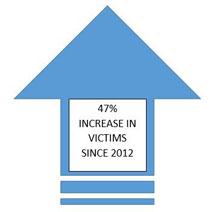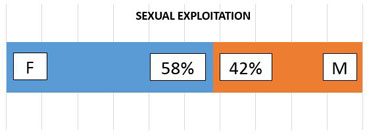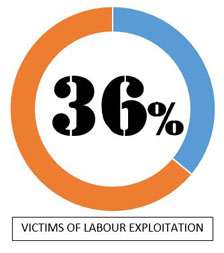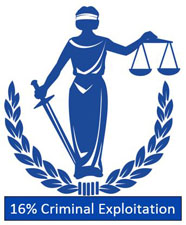Human trafficking and modern slavery
Human trafficking
Although many people think of human trafficking as only affecting adults, it affects children as well. Child trafficking is child abuse. Children are recruited, moved or transported and then exploited, forced to work or sold. They are often subject to multiple forms of exploitation. It is also not just about trafficking adults and children across national borders, human trafficking can take place anywhere.
The United Kingdom is the most prominent country of origin for trafficked children – a total of 255 reported cases – followed by Albania (227), Vietnam (227), Afghanistan (74), Eritrea (48), Nigeria (43) and Iran (42) - data from the National Crime Agency, National Referral Mechanism Statistics: End of Year Summary, 2016.
Children are trafficked for:
- child sexual exploitation
- benefit fraud
- forced marriage
- domestic servitude such as cleaning, childcare, cooking
- forced labour in factories or agriculture
- criminal activity such as pickpocketing, begging, transporting drugs, working on cannabis farms, selling pirated DVDs and bag theft
Many children are trafficked into the UK from abroad, but children can also be trafficked from one part of the UK to another.
Modern slavery
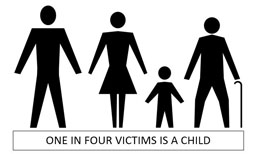
Modern slavery can take many forms including the trafficking of people, forced labour, servitude and slavery.
Any consent victims have given to their treatment will be irrelevant where they have been coerced, deceived or provided with payment or benefit to achieve that consent.
Children (those aged under 18) are considered victims of trafficking, whether or not they have been coerced, deceived or paid to secure their compliance. They need only have been recruited, transported, received or harboured for the purpose of exploitation.
The term Modern Slavery captures a whole range of types of exploitation, many of which occur together.
These include but are not limited to:
Sexual exploitation
This includes but is not limited to sexual exploitation and sexual abuse, forced prostitution and the abuse of children for the production of child abuse images and videos.
Domestic servitude
This involves a victim being forced to work in usually private households, usually performing domestic chores and childcare duties. Their freedom may be restricted and they may work long hours often for little or no pay, often sleeping where they work. A quarter (24%) of reported victims of domestic servitude in the UK are children.
Forced labour
Victims may be forced to work long hours for little or no pay in poor conditions under verbal or physical threats of violence to them or their families. It can happen in various industries, including construction, manufacturing, laying driveways, hospitality, food packaging, agriculture, maritime and beauty, including nail bars. Often victims are housed together in one dwelling. Over a third (36%) of reported victims of Modern Slavery are subject to forced labour. One fifth of all reported forced labour victims are children – an increase of 24% since 2012. Three quarters of all reported forced labour victims are male.
Criminal exploitation
This can be understood as the exploitation of a person to commit a crime, such as pick-pocketing, shop-lifting, cannabis cultivation, drug trafficking and other similar activities that are subject to penalties and imply financial gain for the trafficker. 16% of reported Modern Slavery victims are also involved in fraud or financial crime whereby perpetrators force victims to claim benefits on arrival but the money is withheld, or the victim is forced to take out loans or credit cards. Cannabis cultivation is the next most common form of criminal exploitation – and 81% of those exploited are children, most of whom are from Vietnam.
Other forms of criminal exploitation include:
- Organ removal
- Forced begging
- Forced benefit fraud
- Forced marriage
- Illegal adoption
Resources and further information
- Care of unaccompanied migrant children and child victims of modern slavery (DfE 2017)
- Safeguarding children who may have been trafficked: practice guidance (DfE 2017)
- Preventing trafficked children going missing - information and advice for professionals
- Modern slavery briefing
- Modern slavery duty to notify
- Modern slavery poster
The NSPCC's Child Trafficking Advice Centre (CTAC) has produced a leaflet, translated into 12 languages, for children who have come to the UK from another country. The leaflet explains how to ask for help; who to ask for help; what words like "refugee", "asylum seeker" and "trafficking" mean and what help is available for children who have come to the UK from another country. The leaflets can be downloaded from NSPCC learning: child trafficking leaflets for children and young people.
Human trafficking and modern slavery - the key issues for Swindon and Wiltshire in 2017
Labour exploitation within car washes is the largest threat. Amongst many factors, the emergence of this form of exploitation is economically driven. Many foreign nationals who work within car washes in Wiltshire and Swindon originate from impoverished countries, predominately Romania and Albania. Desperate for work and accustomed to working for less, workers within car washes are often left in the vulnerable situation whereby a life of exploitation in the UK is better than a life of unemployment and poverty back home.
The exploitation of workers is believed to be organised and many workers will be trafficked into Wiltshire and Swindon specifically to work at car washes. Car washes can provide the perfect cover for different types of crime and can be linked to organised crime groups. Many of those associated to these businesses have little interaction with the Police and other agencies, however those that do generally come to notice as perpetrators, often for offences of violence.
Acceptance into the National Referral Mechanism (NRM) process is low, workers either distrust authorities, have bad experiences with law enforcement (especially if investigated as offender/suspect) or are scared their controllers will enact retribution against them or their families back home. It is highly unlikely that potential victims will engage in the NRM or accept help if their controller shares the same nationality. Potential victims will often not respond positively when visited randomly by Police and do not believe that the Police can safeguard them. This perception may be fuelled by those victims who initially engage with the NRM to be removed from this process at a later date. In these cases, those deemed not to be a victim may return to their communities and speak negatively about our safeguarding processes and Police, especially if that person cannot understand why they were deemed not to be a victim.
Labour exploitation within traveller sites is our second largest threat. The drivers of this form of slavery are in many cases identical to those associated with car washes. The desire to secure employment means victims will often accept lower levels of pay and substandard living conditions with the emergence of Romanian victims further reinforcing the troubling concept that many see a life of exploitation in the UK as their only option to secure a better life.
What is less hidden with this type of slavery is the recruitment process. Many of the perpetrators of this form of slavery do not have connections to countries such as Romania and rely on approaching vulnerable (often homeless, unemployed or substance/alcohol dependant) victims in this country, promising employment, fair pay and accommodation. With the absence of these international connections, the threat of ‘hurting family back home’ or fear of not being able to return home due to retribution is diminished. This could very well explain why over the last two years a significant number of potential victims of traveller related slavery (often of Romanian origin) agreed to a referral into the NRM, whilst many fewer car wash workers agreed to this process.
Labour exploitation within nail bars is an emerging, increasing threat. The orchestration of this type of slavery is very much unknown, however the exploitation is often visible with young, predominately Vietnamese females forced (through debt bondage, violence and controlled by poor living conditions) to work long hours for little pay within nail bars. Both the victims and offenders are predominately Vietnamese and in many cases the victims have almost always been both trafficked (into and around the UK) and held in slavery.
Nationally there is a suggestion that Vietnamese children are being enrolled in schools in the UK from which they subsequently go missing; a number of these children are then found in nail bars across the country. It is inferred that this activity and movement is facilitated by Vietnamese Organised Crime Groups who use complex networks to move the children from one end of the country to the other. It has also been suggested that social media is often used to recruit the vulnerable children.
Transient exploitation
Wiltshire and Swindon frequently experience cases of ‘transient exploitation’ whereby foreign nationals living outside our county are being forced to travel to Wiltshire and Swindon in order to commit crime. Many potential incidents of forced theft/fraud are recorded and there has been an increase in five of our towns (Swindon, Trowbridge, Melksham, Chippenham and Bradford-on-Avon).
The people associated to these types of crime are almost always treated as offenders, there is no evidence to suggest that slavery or trafficking is considered when engaging with the foreign nationals involved. This is an area that all agencies need to improve, so that we are able to identify the people exploited in this way.
Exploitation within the regulated sector
Slavery within food processing businesses, specifically chicken farms has been highlighted as a possible threat. Wiltshire and Swindon is ranked 6th nationally in relation to the number of chicken farms operating, this increases the probability that exploitation of this type is occurring within our county. There is a suggestion that Polish nationals have been trafficked to the UK to install solar farms and are working seven days a week for below minimum wage.
Potential victims of this type of exploitation are often vulnerable (homeless and unemployed) and tend to be recruited by traffickers directly rather than via social media. Within Wiltshire and Swindon numerous solar farms have emerged over recent years. The construction of solar farms has not escaped the press or local campaigning groups, sites can span over acres of land and require a sizeable labour force to assist with initial installation. This labour force is often transient and only stay in an area for the initial installation phase.

